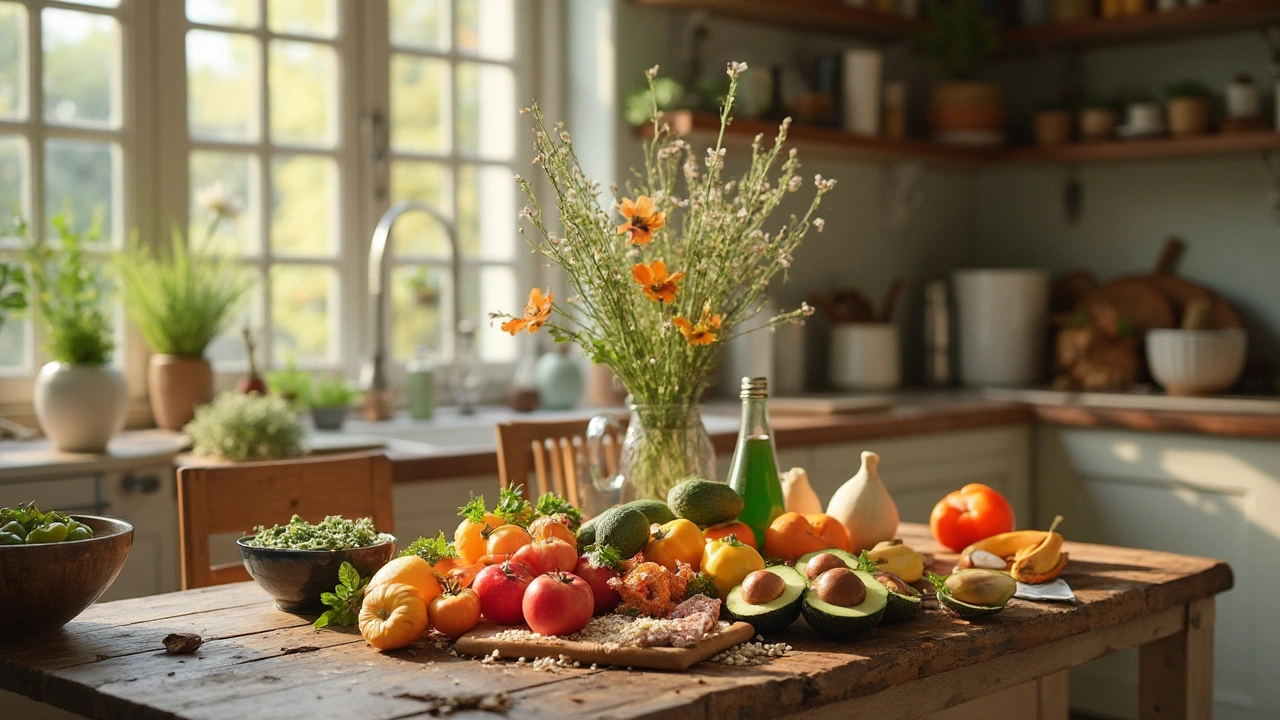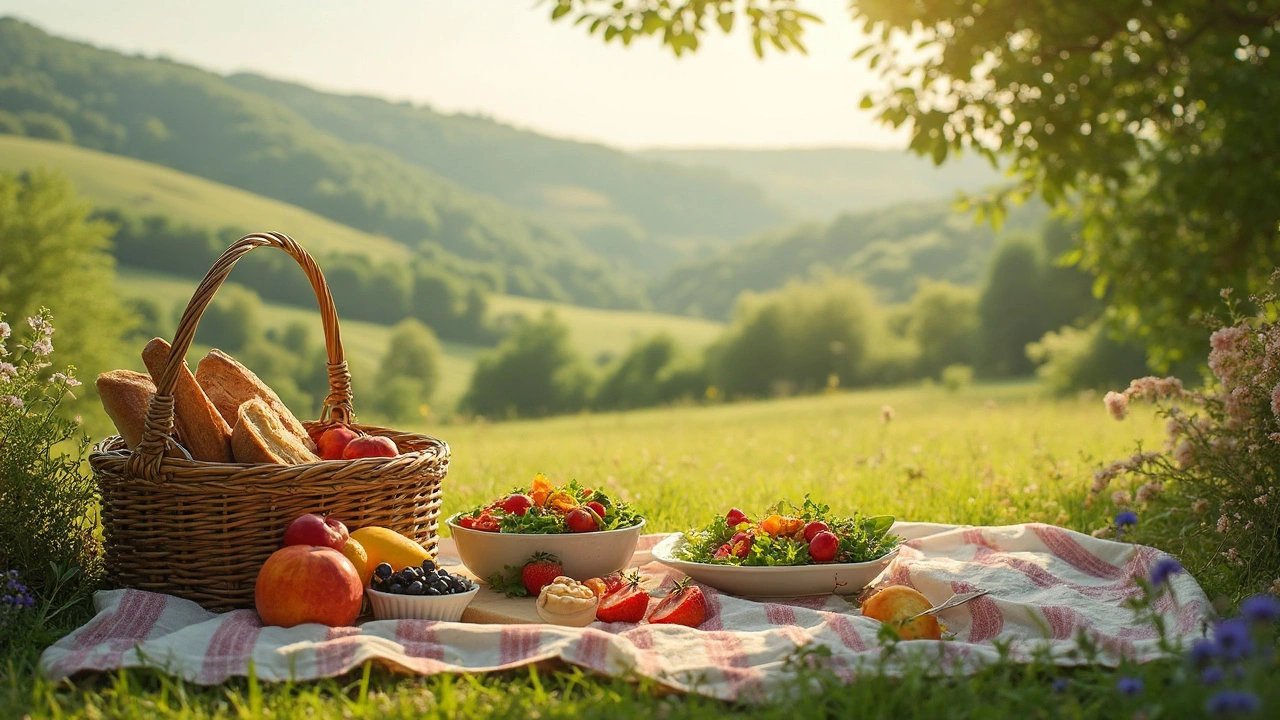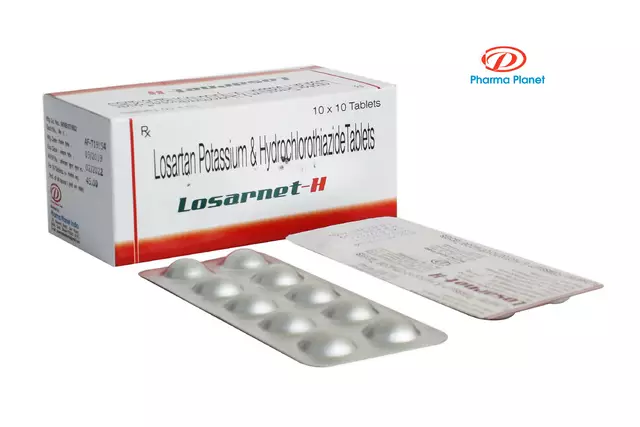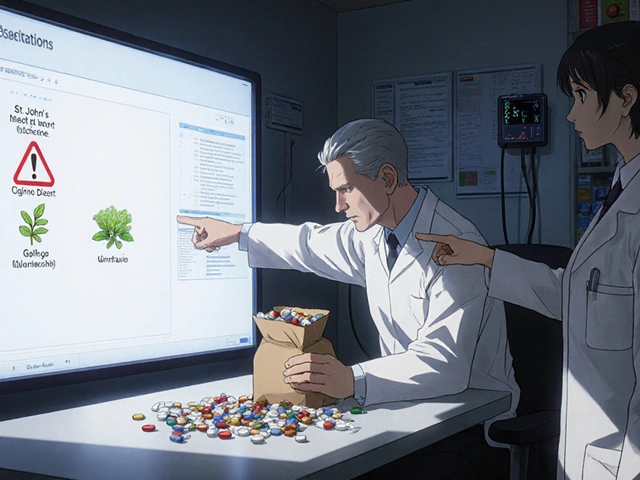
Gallstones aren't exactly on most people's radar, yet they can sneak up on you with a vengeance. Ever had that intense pain on your right side? It might just be those tiny, hard deposits messing with your gallbladder. But here's the good news—your diet can make a world of difference!
First up, let's chat about the villains of our story: fatty foods. Burgers, fries, cheesy pizzas—they might taste great, but they're not doing your gallbladder any favors. Swapping these out for lean meats and fish is a game-changer.
Now, what should be your new best friend? Fiber! Fruits, veggies, whole grains—they're all fantastic for keeping your digestion smooth and steady, helping your gallbladder process things without a hitch.
Let's not forget the power of hydration. Drinking plenty of water aids digestion and keeps everything flowing just right. Plus, it's the simplest way to protect your gallbladder health.
- Understanding Gallstones
- Foods to Avoid
- Foods to Embrace
- Importance of Fiber
- Hydration Tips
- Consistency is Key
Understanding Gallstones
Gallstones are like those unwelcome party crashers no one invited. They form in your gallbladder, which is that small organ under your liver responsible for storing bile – a fluid that helps digest fats. But when there's a hiccup, gallstones can develop. Crazy, right?
So what exactly are these little troublemakers? Basically, they're hard pieces formed mainly from cholesterol or bilirubin – not what you’d expect, huh? These stones can be as tiny as a grain of sand or as big as a golf ball. You'd think they'd be easy to spot, but some folks don’t even know they have them!
What Causes Gallstones?
Well, there’s no single villain, but a few usual suspects make the list. A high-fat diet, obesity, certain medical conditions, and genetics all play their part. Even sticking to a rapid weight-loss plan can lead to forming gallstones. Who knew trying to shed some pounds fast could backfire like that?
Risk Factors
A few people are more likely to hear the gallstone alarm. Women over the age of 40, pregnant women, and those with a family history of gallstones are in the spotlight. Also, if you suffer from certain medical conditions like diabetes, it ups your odds.
Recognizing the Symptoms
Now, not everyone gets tipped off right away. Some folks are lucky enough not to experience any symptoms at all. But for others, when gallstones act up, they sure make a scene with sharp pain in the upper abdomen, nausea, and even jaundice.
Isn't it fascinating how something seemingly minor can have such an impact? Understanding these basics about gallstones can help you dodge potential health hiccups.
Foods to Avoid
Alright, let's tackle the foods you should probably steer clear of if you're looking to keep those pesky gallstones at bay. A gallstone-friendly diet means saying goodbye to some of the usual culprits that make your gallbladder work harder than it should.
High-Fat Foods
First on the hit list are high-fat foods. We're talking about those mouth-watering yet sneaky snacks like fried chicken, crispy bacon, and buttery pastries. Sure, they taste fantastic, but they can increase the amount of cholesterol in your bile. High cholesterol is a known contributor to gallstone formation, so keeping these indulgences to a minimum is wise.
Processed Foods
Next up, processed foods! These guys often come with loads of unhealthy fats and can contribute to poor gallbladder health. If it's pre-packaged, has a long shelf life, or you can't pronounce half the ingredients, it's probably best to avoid it. This means swapping out your instant noodles and frozen pizzas for fresher, whole foods.
Sugar Spikes
Let's not forget about sugar. Yes, the sweet stuff! Consuming high amounts of refined sugars found in sweets, sugary beverages, and even white bread can cause spikes in insulin, which researchers suggest might be linked to gallstones. It's not just about cutting candy; it's also watching out for hidden sugars.
Red Meat and Full-Fat Dairy
Red meat and full-fat dairy products are another red flag. These are typically high in saturated fats, which can lead to the dreaded cholesterol build-up. Think steak, cheddar cheese, and full-cream milk—maybe opt for lean cuts, plant-based milk, or lower-fat dairy options instead.
Alcohol Alert
And, for those who love to unwind with a few drinks, remember that excessive alcohol can be hard on your liver and gallbladder. Moderation is key if you want to maintain a healthy balance. So maybe pass on that second cocktail?
Staying mindful of these dietary choices can help your gallbladder function smoothly and keep those gallstones from becoming a literal pain in your side.
Foods to Embrace
When it comes to a gallstone-friendly diet, it's all about the foods that work with your body, not against it. Let's get into what you should be piling onto your plate.
Lean Proteins
Proteins are essential, but not all proteins are created equal. Go for lean options like chicken breast, turkey, and fish. Ever tried salmon or tuna? They're not only delicious but packed with omega-3 fatty acids, which are great for overall health.
- Grilled or baked chicken and turkey, without the skin
- Fish like salmon and mackerel, either grilled or steamed
- Egg whites or plant-based proteins like tofu and lentils
Fruits and Vegetables
Fruits and veggies are your best friends here. They're not just full of vitamins but fiber too! Apples, berries, and citrus fruits help maintain a healthy digestive system.
- Apples, bananas, and pears
- Berries like strawberries and blueberries
- Leafy greens such as spinach, kale, and arugula
- Carrots, sweet potatoes, and bell peppers
Whole Grains
Whole grains are a key player in this diet. Choose oatmeal, brown rice, and whole-grain bread which offer a lot more fiber than their white counterparts.
Healthy Fats
Wait, fats? Yes, but the good kinds! Avocados, nuts, and seeds are packed with healthy fats that don't upset your gallbladder. Try using olive oil or coconut oil instead of butter for cooking.
- Avocado as a topping or snack
- Nuts like almonds and walnuts in moderation
- Flaxseeds and chia seeds even added to smoothies
- Olive oil in salads and for gentle cooking
By choosing these foods to embrace, you're putting your gallbladder in a happy place. It's all about making choices that promote optimal health.

Importance of Fiber
When it comes to keeping gallstones in check, fiber is like your dependable ally. So, why should you care about this plant-based wonder? Well, fiber plays a huge role in making sure your gallbladder doesn't get too cozy forming stones.
First off, fiber helps keep your digestive system running smoothly. It binds with cholesterol and bile acids in your intestines, which means less chance for gallstones to form. Pretty neat, huh?
The Types of Fiber: Soluble vs. Insoluble
There are two types of fiber to focus on: soluble and insoluble. Soluble fiber is found in oats, beans, and apples. It's great because it helps reduce those pesky cholesterol levels. Insoluble fiber, found in whole grains and nuts, acts like a scrub brush for your intestines, ensuring everything moves along nicely.
How Much Fiber Do You Need?
So, how much should you be aiming for? The general guideline is around 25-30 grams of fiber a day. A bit of breakfast cereal here, some fruits and veggies there, and you're well on your way to meeting that goal! Want to boost your diet seamlessly? Check out this quick list:
- Start your day with a high-fiber cereal.
- Add beans to soups or salads.
- Choose whole fruit over fruit juice.
- Snack on raw veggies rather than chips.
Extra Fiber Benefits
Apart from warding off gallstones, fiber has other health perks. It helps maintain a healthy weight, lowers the risk of diabetes, and keeps your heart ticking just fine. Plus, it gives you that satisfying fullness that curbs overeating. All wins!
If you're curious about how different foods stack up in terms of fiber, have a look at this handy table:
| Food Item | Fiber Content (per 100g) |
|---|---|
| Chickpeas | 7.6g |
| Oats | 10.1g |
| Broccoli | 2.6g |
| Apples | 2.4g |
All in all, giving fiber a front-row seat in your health plan will pay off in spades, especially when it comes to protecting your gallbladder. So next time you're at the grocery store, stock up on those fiber-rich goodies!
Hydration Tips
Alright, let’s dive into why staying hydrated is a no-brainer, especially if you’re looking out for your gallbladder. Water is like the unsung hero of our body, keeping things smooth and easy. But how much should you chug down each day? Aim for about 8 cups—think of it as keeping yourself topped up to avoid trouble with gallstones.
Why Water Matters
So why is water such a big deal? Well, water helps dilute bile, the digestive fluid made by your liver. Diluted bile is less likely to form stones. And since our bodies are mostly water, staying hydrated ensures those essential bodily functions keep ticking.
Mix It Up
If plain water bores you to tears, spice it up a bit. Toss in some lemon or cucumber slices. Herbal teas work too, and they contribute to your daily water intake.
Watch Out For Dehydrators
Keep a close eye on drinks that might actually dehydrate you. Caffeine and alcohol are the usual suspects—enjoy them in moderation and balance out with plenty of water.
Track Your Intake
Find it tough to keep track of your water intake? Use apps or set reminders on your phone. Otherwise, carrying a water bottle can be a great visual cue to stay on top of things.
Quick Stats
| Age Group | Approximate Daily Water Needs (in liters) |
|---|---|
| Adults | 2.5-3.7 |
| Teens | 2-2.8 |
In short, keeping yourself hydrated is simple yet super effective in maintaining a gallstone-friendly lifestyle. Plus, your entire body will thank you, not just your gallbladder!
Consistency is Key
Ever tried sticking to a new diet and fell off the wagon? It happens to the best of us. But here's the deal: when it comes to a gallstone-friendly diet, consistency can make a huge difference. Think of it as giving your gallbladder a smooth ride, free of bumps on the road.
Make it a Habit
Creating a routine with your meals helps your body know what to expect. Try to eat your meals around the same time every day. This might sound a bit restrictive, but your gallbladder loves the predictability. When you keep things consistent, it's less likely you'll have an overproduction of bile, which can form gallstones.
Small Changes, Big Impact
No one's asking you to revolutionize your diet overnight. Start with small tweaks like incorporating more whole grains and fewer processed foods. Switch out that morning muffin for oatmeal, or slide some extra veggies onto your dinner plate. These gradual shifts can boost your health in the long run, keeping those gallstone troubles away.
Track Your Progress
Keeping a food journal can be super helpful. Not only does it serve as a reminder of the good choices you're making, but it also allows you to spot patterns or certain foods that might be causing issues. Logging your meals might seem tedious, but even a casual note on your phone can do wonders.
| Consistency Tips | Benefits |
|---|---|
| Eat meals at the same time daily | Regulates bile production |
| Incremental diet changes | Sustainable success |
| Use a food diary | Identify potential triggers |
Remember, it's all about making your new diet feel like the normal thing to do. With a little patience and consistency, you can keep those pesky gallstones at bay and enjoy a much healthier life. Your gallbladder will thank you!





Darci Gonzalez
March 21, 2025 AT 01:02Drink plenty of water and add extra fiber from fruits and veggies-you’ll keep your gallbladder happy 😊
Marcus Edström
March 29, 2025 AT 01:10Including lean proteins such as turkey or fish can reduce the workload on the biliary system. Whole‑grain options like oatmeal also support steady bile flow. Consistency in meal timing further helps regulate bile production. This approach aligns well with cultural dietary patterns.
kevin muhekyi
April 6, 2025 AT 02:17I’ve found that sticking to a regular eating schedule makes a noticeable difference in digestion; the body seems to adapt and the occasional right‑side discomfort fades. Adding a side of steamed broccoli or a handful of berries each morning gives extra soluble fiber without extra hassle.
Teknolgy .com
April 14, 2025 AT 02:24One could argue that the battle against gallstones is nothing more than a dietary arms race-swap the fries for fish and you proclaim victory, yet the underlying biochemistry remains stubbornly unchanged 😏. Still, the practical benefit of fewer saturated fats is undeniable.
Caroline Johnson
April 22, 2025 AT 02:31Avoiding high‑fat foods, especially deep‑fried items, is not merely a suggestion; it is a necessity,,,,,,,,,,,,,! Consistency in fiber intake,,,,,,,, ‑ for instance, incorporating a cup of oatmeal each morning‑‑‑‑‑‑‑‑‑‑‑‑‑‑‑‑ ‑‑‑‑‑‑‑‑‑‑‑‑‑‑‑-,, .
Megan Lallier-Barron
April 30, 2025 AT 02:38While many champion fiber as the hero, one might wonder if the obsession with soluble types ignores the role of insoluble fibers in gut motility 🤔. Perhaps a balanced approach is more philosophical than dogmatic.
Kelly Larivee
May 8, 2025 AT 02:45Try adding a banana or some oats to breakfast. It’s easy and helps keep the gallbladder calm.
Emma Rauschkolb
May 16, 2025 AT 02:52The psychosomatic impact of chronic biliary discomfort can trigger a cascade of cortisol‑mediated inflammatory pathways, effectively turning a mild dietary misstep into a systemic stress response 🌪️. Mitigating this with hydrophilic macronutrient ratios is paramount.
Kaushik Kumar
May 24, 2025 AT 02:59Remember, hydration isn’t just about water-herbal teas, infused waters, and even clear broths count!! Aim for at least eight 8‑oz servings daily!!! Your gallbladder will thank you!!!
Mara Mara
June 1, 2025 AT 03:06From an American nutritional perspective, prioritizing lean poultry and native whole grains aligns perfectly with national health guidelines; therefore, integrating blueberries and kale into meals is both patriotic and beneficial!!!
Jennifer Ferrara
June 9, 2025 AT 03:14It is with a certain gravitas that one must consider the epistemological foundations of dietary regimens, for unto the gallbladder we owe not merely sustenance but an orchestrated symphony of macronutrients; henceforth, thou shouldst imbibe with measured deliberation.
Terry Moreland
June 17, 2025 AT 03:21I get it, making changes can feel overwhelming-start simple, like swapping soda for water and adding a side salad. Little steps add up and you’ll notice the difference.
Abdul Adeeb
June 25, 2025 AT 03:28Maintaining a gallstone‑friendly diet requires an integrated approach that balances macronutrient quality, meal timing, and adequate hydration. First, it is essential to limit the intake of saturated fats by opting for lean animal proteins such as skinless poultry and oily fish rich in omega‑3 fatty acids. Second, the inclusion of diverse fiber sources-both soluble, found in oats and legumes, and insoluble, present in whole‑grain breads and seed coats-promotes optimal bile flow and reduces cholesterol crystallization. Third, regular consumption of water, targeting a minimum of two liters per day, dilutes bile salts and discourages stone formation. Fourth, spacing meals evenly throughout the day avoids excessive bile concentration that can occur with prolonged fasting periods. Fifth, incorporating antioxidant‑rich fruits, particularly berries and citrus, supports hepatic function and mitigates oxidative stress. Sixth, limiting refined sugars and simple carbohydrates helps prevent insulin spikes that may influence cholesterol metabolism. Seventh, moderate physical activity enhances gastrointestinal motility and improves overall metabolic health. Eighth, monitoring portion sizes prevents excessive caloric load that can exacerbate gallbladder strain. Ninth, avoiding rapid weight‑loss regimens reduces the risk of cholesterol supersaturation in bile. Tenth, selecting cooking methods such as steaming, grilling, or baking minimizes added fats. Eleventh, using healthy oils like olive oil in moderation contributes beneficial monounsaturated fats. Twelfth, maintaining a food diary assists in identifying personal triggers and ensuring compliance. Thirteenth, consulting a registered dietitian provides tailored guidance based on individual health status. Fourteenth, periodic medical check‑ups allow for early detection of gallbladder abnormalities. Fifteenth, staying informed about emerging research on bile acid modulators can further refine dietary strategies. Finally, adopting these practices consistently over time cultivates a resilient gallbladder and promotes long‑term well‑being.
Abhishek Vernekar
July 3, 2025 AT 03:35I wholeheartedly agree with the comprehensive plan outlined above; moreover, the emotional relief that accompanies disciplined eating cannot be overstated, and I encourage anyone struggling with gallbladder concerns to embrace these steps with optimism.
Val Vaden
July 11, 2025 AT 03:42Your gallbladder will thank you, trust me 😐
lalitha vadlamani
July 19, 2025 AT 03:49One must not overlook the moral imperative of honoring one’s own physiology; neglecting dietary stewardship is tantamount to hubris.
kirk lapan
July 27, 2025 AT 03:56Honestly, if you’re still reading this, you’ve missed the point-just stop eating cheese and be done.